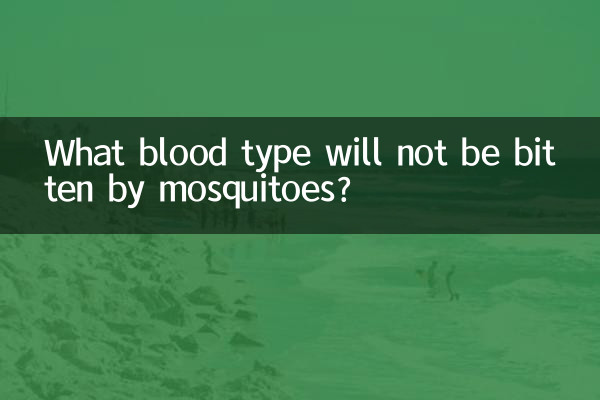What blood type is immune to mosquito bites? Uncovering the relationship between blood type and mosquito bites
Every summer, mosquito bites become a headache for many people. Have you ever noticed that some people seem to be especially attracted to mosquitoes, while others rarely get bitten? In recent years, the relationship between blood type and mosquito bites has become a hot topic. This article will combine the hot content on the Internet in the past 10 days to reveal the relationship between blood type and mosquito bites.
1. Research background on blood type and mosquito bites

The selectivity of mosquito bites has long been a subject of research by scientists. Multiple studies have shown that mosquitoes are affected by a variety of factors when choosing to bite, including carbon dioxide emissions, body temperature, sweat composition and blood type. Among them, the relationship between blood type and mosquito bites is of particular concern.
2. Comparison of the probability of being bitten by mosquitoes according to different blood types
| blood type | Probability of being bitten by mosquitoes | Research basis |
|---|---|---|
| O type | highest | Multiple studies have shown that blood type O is most easily detected by mosquitoes |
| Type A | lower | Some studies show that blood type A is less likely to be bitten |
| Type B | medium | Between type O and type A |
| AB type | lowest | Some experiments show that blood type AB is least likely to be bitten |
3. Other important factors affecting mosquito bites
While blood type does affect the likelihood of a mosquito bite, it's not the only factor. Here are some equally important influencing factors:
| Influencing factors | Mechanism of action | degree of influence |
|---|---|---|
| CO2 emissions | Mosquitoes can detect carbon dioxide sources up to 50 meters away | very high |
| body temperature | Higher body temperatures are more likely to attract mosquitoes | high |
| Sweat components | Substances such as lactic acid and uric acid attract mosquitoes | in |
| skin flora | Specific combination of bacteria creates odor that attracts mosquitoes | in |
| clothing color | Dark clothing is more likely to attract mosquitoes | low |
4. Practical Advice on Preventing Mosquito Bites
No matter what your blood type, taking appropriate protective measures can effectively reduce the chance of mosquito bites:
1.Use mosquito repellent products:Choose a mosquito repellent containing DEET, picaridin, or oil of lemon eucalyptus.
2.Wear light-colored clothing:Mosquitoes are more likely to be attracted to dark colors, so it is recommended to wear light-colored clothing when going out in summer.
3.Keep the environment dry:Clean standing water in your home regularly to eliminate mosquito breeding grounds.
4.Physical protection:Use a mosquito net or wear long-sleeved clothing during periods when mosquitoes are active (dusk and dawn).
5.Adjust your diet:Some studies show that intake of garlic, vitamin B, etc. may change body odor and reduce attractiveness.
5. Common misunderstandings about blood type and mosquito bites
When discussing the relationship between blood type and mosquito bites, there are several common misunderstandings to be aware of:
Misunderstanding 1:Certain blood types are completely immune to mosquito bites. In fact, people of all blood types can be bitten, but at different rates.
Misunderstanding 2:Blood type is the only factor that determines mosquito bites. As mentioned earlier, multiple factors work together to influence mosquito selection.
Misunderstanding three:Changing your blood type can prevent mosquito bites. Blood type is determined innately and cannot be changed.
6. Expert opinions and latest research progress
According to a recently released research report, scientists have a new understanding of the relationship between blood type and mosquito bites:
1. A Japanese study found that mosquitoes’ preference for type O blood may be related to the secretion of blood group antigens on the skin surface.
2. Research published in the American Journal of Tropical Medicine pointed out that blood group antigens are released to the body surface through sweat and other secretions, affecting mosquito perception.
3. The latest experimental data shows that in the same environment, people with type O blood are about 83% more likely to be bitten than people with type A blood.
Although AB blood type is theoretically the least likely to be bitten by mosquitoes, experts caution that due to the low proportion of people with AB blood type (about 5% globally), relevant data samples are limited and more research is needed to verify it.
Conclusion
Blood type does play a factor in mosquito bites, but it's not the only determining factor. Understanding this knowledge can help us better prevent mosquito bites, but we don’t have to worry too much about our blood type. Taking comprehensive protective measures is the most effective way to deal with mosquito bites. Next time you are "preferred" by mosquitoes, maybe think humorously: it may be because you are too "popular"!

check the details

check the details